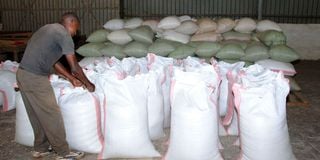State bans importation of maize, wheat

A farmer delivers his maize at the National Cereals and Produce Board in Elburgon, Molo. President William Ruto says the government has set aside Sh4 billion to buy maize from farmers this season.
It is a relief for maize and wheat farmers after the government banned importing the commodities to protect the local market from cheaply imported produce that will destabilise prices.
President William Ruto halted the issuance of new permits to import the grains, noting that his administration will only reverse the decision if the country faces a shortage.
The Head of State revealed that his government has set aside Sh4 billion to buy maize from farmers this season as most of them start harvesting ahead of the expected El Niño rains.
"No permits will be issued to millers to import wheat or maize into the country. This is to protect our farmers against price fluctuations in the market," Dr Ruto said at State House, Nairobi, when he met a delegation from Narok and Samburu counties.
The delegation was led by Governors Patrick Ole Ntutu (Narok) and Jonathan Leleliit (Samburu), Narok West MP Gabriel Tongoy and Narok North MP Agnes Pareiyo.
President Ruto cautioned farmers against selling their produce to middlemen at throwaway prices, noting that the government is determined to mobilize produce at competitive prices.
He revealed that the government will provide dryers and waive drying charges to curb post-harvest losses.
"The drying facilities will enable farmers who are not ready to sell their produce to the National Cereals and Produce Board to dry and store the produce," he explained.
According to the Kenya National Bureau of Statistics, Kenya has imported an average of 295,092 tonnes of maize annually over the past five years.
The country's annual maize requirement is 52 million bags - for human consumption, animal feed production, seed multiplication and manufacturing of other products.
Also Read: State slashes tax on imported rice
According to Trans Nzoia County Executive Member for Agriculture Phanice Khatundi, this season's maize yield in the county is expected to be 5.6 million bags, while local consumption is about 2 million bags, with an estimated 3.6 million bags released to the market.
"We are expecting a bumper harvest this season and measures have been put in place to minimise post-harvest losses," said Ms Khatundi.
Uasin Gishu County is expected to harvest about 4.5 million bags of maize, of which more than 2.5 million bags will be released to the market.
The country produces an average of 365,600 metric tonnes against a consumption of 8.4 million 90 kg bags (about 756,000 metric tonnes), forcing the country to import the deficit.
The Rift Valley region produced an average of 4.5 million bags of wheat from 127,825 hectares planted last season.
In Uasin Gishu County, the area under wheat production has dropped from 40,000 hectares to 18,000 hectares as farmers diversify into other lucrative investments such as maize, horticulture and dairy farming.
"There is a huge decline in acreage under wheat production in the last 10 years, which has had a negative impact on the consumption and cost of wheat products," the devolved unit's annual agriculture report said.
According to outgoing Agriculture Principal Secretary Kello Harsama, the country expects to harvest 44 million bags of maize this season, with an additional 23 million bags coming from the North Rift region due to the availability of affordable fertiliser through the government's subsidy programme.
He also defended the decision to import the yellow maize into the country, noting that the importation was meant to help reduce the cost of livestock feed and not hurt local maize farmers.
"President William Ruto has directed that we buy yellow maize because dairy farmers are struggling with high feed costs due to the shortage of fodder. These imports will reduce the competition of white maize, which is used to feed our livestock," explained the PS.
He said the Ministry of Agriculture has also started the process of procuring 100 dryers to help farmers dry produce this season amid fears of high post-harvest losses as a result of the El Niño rains.
He noted that the dryers will be distributed within the next month to curb post-harvest losses in various counties.
Uasin Gishu County will receive 12 new dryers.
"We have ordered the dryers from outside the country and the first purchases will be available in the country within the next 30 days. We will agree with the county leadership where we will take these dryers... We have more than five dryers in different shops and money has been allocated to NCPB to help the farmers," said Mr Harsama.
NCPB Managing Director Joseph Kimote assured the farmers that the state agency is ready to receive their produce once the government announces new prices.
"We are ready to receive farmers' produce as soon as we get instructions from the government. We will no longer write cheques, we will only use the funds that will be made available," said the managing director, noting that the agency has a capacity of 20 million bags.





